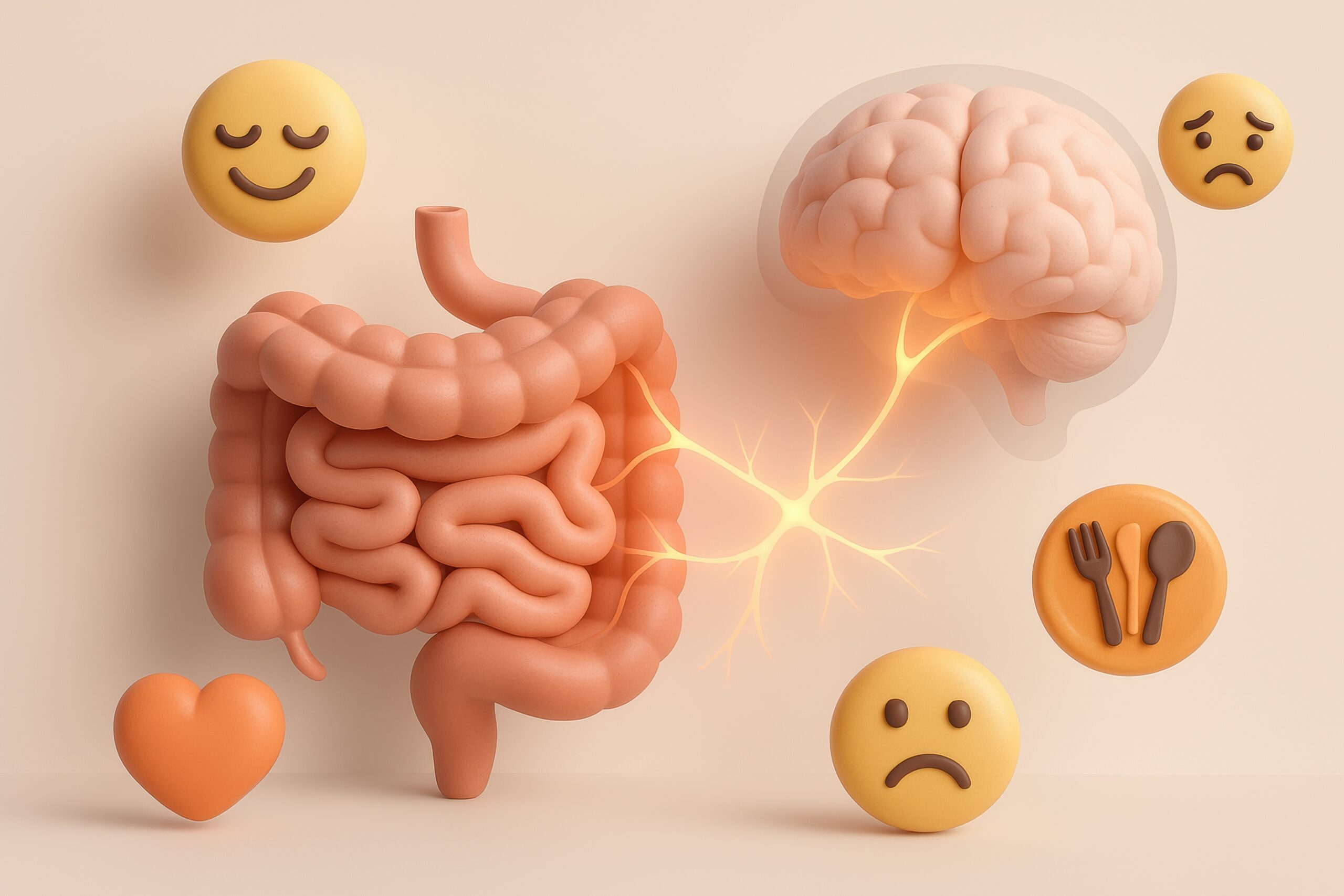May is Mental Health Awareness Month, and while therapy and self-care often take the spotlight, research is drawing attention to another key player in mental wellness: your gut. Your gut health and mental health are deeply connected, and your microbiome may be influencing your mood more than you realize.
Imagine waking up feeling exhausted, bloated, and mentally foggy. You chalk it up to a rough night’s sleep or too much stress — but what if the real culprit is lurking in your gut?
Gut health is about more than just digestion — it’s a powerful regulator of mood, memory, and motivation. According to Cleveland Clinic, up to 90% of serotonin — the brain’s “feel-good” chemical — is produced in the gut. That makes the gut-brain axis a central player in mental wellness. As interest in gut health grows across platforms like TikTok, researchers are now confirming what wellness influencers have hinted at for years: taking care of your microbiome may be just as important as taking care of your mind.
So if you’ve ever asked yourself, “Is my gut health sabotaging my mental health?” — the answer might be yes. And understanding the connection is the first step to doing something about it.
Why Gut Health and Mental Health Are More Connected Than You Think

Think of your gut as the command center of your body. It’s not just processing food — it’s sending signals to your brain, regulating hormones, and supporting your immune system. This communication is so vital that researchers often refer to the gut as the body’s “second brain.” When this system is in balance, you’re more likely to feel mentally clear, emotionally steady, and physically energized. But when it’s disrupted, the effects ripple across both your physical and mental health
The Gut-Mental Health Connection: How Your Gut Talks to Your Brain

Scientists are uncovering more evidence that gut health and mental health are deeply intertwined. The state of your microbiome can directly influence how you feel — mentally and emotionally. This growing body of research continues to show how gut function affects emotional regulation and cognitive performance.
You know that feeling of butterflies in your stomach before a big presentation? That’s your gut and brain talking. They constantly exchange information through the gut-brain axis — a network that links emotional and cognitive centers of the brain with intestinal function. It’s a two-way conversation that impacts everything from motivation and memory to digestion and mood.
But when gut inflammation kicks in, it can weaken the intestinal barrier, allowing harmful bacteria to enter the bloodstream. This can trigger a neuro-inflammatory response that disrupts the gut-brain connection.
The result? A mental misfire — leading to brain fog, mood swings, or even symptoms of anxiety and depression.
What’s Disrupting Your Gut-Brain Connection (and Your Mood)?
If you’re feeling off mentally or emotionally and can’t pinpoint why, your gut might be the hidden trigger. The gut-brain connection is incredibly sensitive, and even small changes in your diet, sleep, or stress levels can throw both systems out of balance. Here are a few common disruptors to both your gut and your mental well-being:


Wondering why you’re feeling bloated, fatigued, or just ‘off’? Here are some common culprits that could be disrupting both your gut health and your mental wellness:
- Poor Diet: Think of your gut as a garden — junk food and sugar are like weeds that crowd out healthy bacteria. This imbalance can lead to inflammation, which studies have linked to mood disorders like depression and anxiety.
- Stress: Ever notice your stomach tightening up during stressful situations? Chronic stress can alter gut flora, increasing the risk of inflammation and triggering symptoms of anxiety or depression.
- Sleep Deprivation: Lack of sleep throws off your body’s internal rhythm, impacting your gut’s ability to function properly and your brain’s ability to regulate mood. If you’re not getting quality rest, you may be missing a key part of your health puzzle — learn why sleep is so essential.
- Medications: Overusing antibiotics is like hitting reset on your gut — but not in a good way. It wipes out both the helpful and harmful bacteria, throwing off your gut’s balance and potentially impacting everything from digestion to your mood and mental clarity.

Actionable Steps to Support Gut Health (and Boost Mental Wellness)
The good news? You don’t have to overhaul your entire life to feel better. Small, intentional changes especially those that support your gut-brain connection can lead to big improvements in your mood, clarity, and overall well-being.
Now here’s what you can do to take back control and support both your body and your mind. Ready to give your gut the love it deserves and feel better from the inside out? Let’s begin.
- Eat a Diverse Diet: Fill your plate with colorful, fiber-rich foods like berries, leafy greens, and fermented foods. These are like premium fuel for your gut garden and can also help stabilize mood.
- Manage Stress: Stress not only clouds your mind but also disrupts your gut. Try a 5-minute breathing exercise or a quick walk to reset both. For more on how to handle stress in everyday life, check out these stress management tips. Reducing stress can lower gut inflammation and potentially improve symptoms of anxiety or depression.
- Stay Hydrated: Think of water as the delivery service that helps nutrients reach your gut and flushes out waste. Proper hydration supports gut function and keeps your brain clear and focused.
- Get Active: Exercise boosts circulation and gut motility — keeping things moving and reducing inflammation. It also releases endorphins, the feel-good hormones that can improve mood.
- Consult a Healthcare Provider: If gut issues persist, work with a provider to uncover underlying conditions and develop a targeted action plan. Not sure what to ask? Here are 9 essential questions to ask your doctor. Mental health symptoms like anxiety or depression could be a sign of deeper gut health issues.

You’ve learned how your gut and brain are in constant communication, influencing everything from your mood and focus to how resilient you feel day to day. A healthy microbiome supports clarity, balance, and emotional stability in ways we’re only just beginning to fully understand.
So if you’ve been feeling anxious, foggy, or off without a clear reason, your gut may be playing a bigger role than you realized. And now, you’re equipped with the knowledge and practical steps to do something about it.
This Mental Health Awareness Month, take a moment to tune in to what your body’s been trying to tell you. Because mental clarity doesn’t always start in your head. Sometimes, it starts in your gut.

